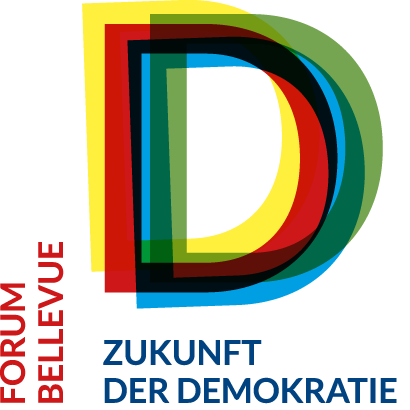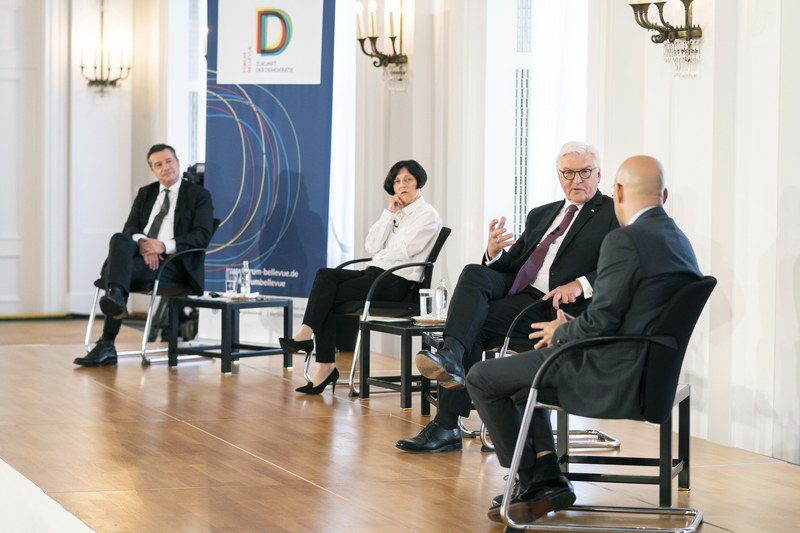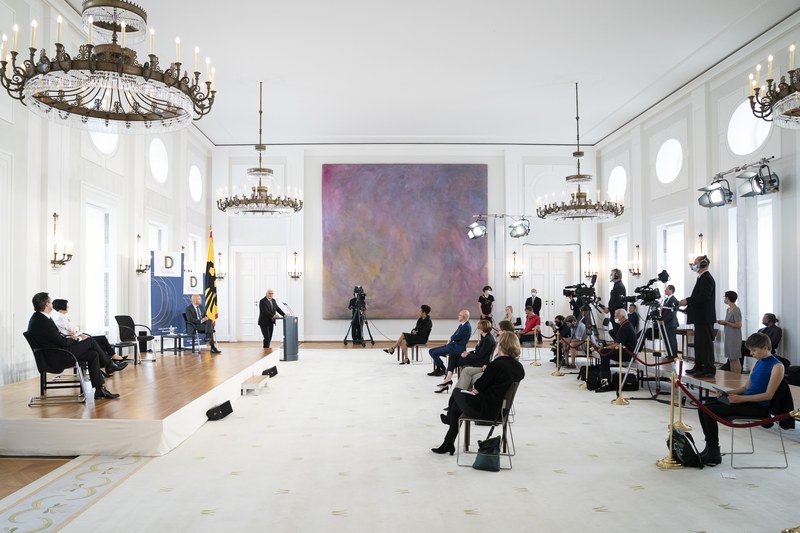"Coronavirus as a Test Case - How is our Democracy Faring?"
29 June 2020
How has our democracy fared so far in the fight against the virus, how has it coped with the restrictions on liberties and what challenges does it now face? Federal President Frank-Walter Steinmeier opened the ninth "Forum Bellevue on the Future of Democracy" with these questions.
"Our democracy can react to existential threats and it can do so swiftly, resolutely and forcefully. Together we can change track at short notice, abandon our customary course of action, make decisions even in the midst of uncertainty and, if necessary, to admit and rectify mistakes", said the Federal President.
Taking stock of the situation at present, the Federal President stated that there had been a successful major effort on the part of society which had not come about because an authoritarian state had forced us but because of our sense of solidarity and responsibility. He went on to say that trust, reason, diversity of opinion and solidarity were the strengths of our democracy which had become apparent in our joint response to the virus. At the same time, a fundamental debate on our society’s future had already begun which needed one thing in particular according to Federal President Steinmeier: the “will to change course” to make the European Union fit for the future, to protect health and peace, pursue a forward-looking climate policy and create a fairer world. He said it was unclear what the world would be like after the corona crisis and that we would have to debate and decide in our democracy what it should be like on an equal and free basis.
The Federal President subsequently began the discussion with his guests Herta Müller (author and Nobel Literature Laureate), Rainer Forst (Professor of Political Theory and Philosophy at the Johann Wolfgang Goethe University of Frankfurt am Main) and Daniel Ziblatt (Eaton Professor of the Science of Government at Harvard University).
Due to social distancing and hygiene measures in the COVID-19 pandemic, the “Forum Bellevue on the Future of Democracy” took place without a large audience. The panel discussion was broadened to include the perspectives of five additional participants: alongside Elke Büdenbender, Marylyn Addo (Professor of Emerging Infections and Head of Infectious Disease at the University Medical Center HamburgEppendorf), Heinz Bude (Professor of Macrosociology at the University of Kassel), Anna-Bettina Kaiser (Chair for Public Law and General Jurisprudence at HumboldtUniversität zu Berlin) and Elisabeth von Thadden (journalist, literary scholar and nonfiction author) were present.
“Democratic interpretation instead of hygiene dictate”
According to the political scientist Professor Rainer Forst, the restrictions on personal liberties as a result of the COVID-19 pandemic should, if possible, be accepted by everyone in an “act of freedom” and should not be seen as a “hygiene dictate”. Only in this way would the resulting costs be accepted as something which society as a whole had to bear.
“We obey fear, not the state – that’s different”
The Nobel Literature Laureate Herta Müller, who herself spent the first 30 years of her life under Ceausescu’s dictatorship in Romania, does not believe that German democracy is at risk due to the restrictions on civil liberties as a result of the pandemic. On the contrary, she said that she was glad to live in a democracy in which the individual counted. During the last few months, she had always felt wellinformed: “Democracy means being informed. And that we believe the information given to us. And I have no reason to doubt it.” She herself experienced the Chernobyl disaster in the Romanian dictatorship and said that she knew what it meant not to be informed of risks by the state. With regard to conspiracy theories, she stated that it was dangerous “to invent something which could damage the precious assets of our society.”
Herta Müller expressed the view that people in Germany acted of their own free will when they accepted and put into practice social distancing measures. Looking back on her experience of growing up in a dictatorship, Herta Müller said, “I see every day that we live in a democracy, and I hope we’ll hold on to it. And I can see no real evidence that this democracy is turning into a dictatorship.”
“Stable democracies have mastered the corona crisis”
In response to the Federal President’s question as to whether the COVID-19 pandemic had accelerated the death of democracies predicted by Daniel Ziblatt, the politics professor from Harvard University pointed out that a differentiation had to be made between resilient and non-resilient democracies. Germany, an example of a resilient democracy, had mastered the crisis and gained in stability. He added that this did not apply to other, non-resilient democracies such as the United States or Brazil. There was a high level of inequality in such countries. What is more, nonfunctioning structures and the polarisation of political adversaries as enemies had accelerated the divisions in society caused by the pandemic.
“There are no definite answers from scientists”
Asked about the role of science in the COVID-19 pandemic, the Hamburg professor, Marylyn Addo, reaffirmed that as a virologist she had examined many issues with implications for democracy in the course of the pandemic. She added that the virus had only been known for six months and that evidence, facts and data were only just being gathered and were increasing every day. It was difficult for society to tolerate the fact that at present scientists were unable to give any definite answers or guarantees. On the other hand, the discussion in the media in its current intensity was new to scientists. Information was often disseminated and published in the media prematurely without being adequately checked. This had further intensified the 2 uncertainty. She said the fact that much thought and effort were currently going into ensuring that drugs and vaccines were available beyond social and geographical boundaries gave her hope.
“Corona has had an immense impact on our physical well-being in the modern world”
The journalist Elisabeth von Thadden introduced a further perspective and stated that “corona has had an immense impact on our physical well-being in the modern world”. In a democracy, the individual has the freedom to be close to others or to choose not to. What becomes of a democracy in which we no longer want to be close to one another due to the virus? She explained how important touch is to people today: “Researchers into touch know that we only feel safe and secure when we are physically close to others and feel that we can touch them, that’s to say, we feel the connection with others which flows back and forward between human beings in the form of voices, looks, gestures and body language. This is fundamental to freedom in vibrant democracies.”
The journalist went on to say that due to the social distancing rules, we were cut off from this kind of intimacy. Elisabeth von Thadden fears that people will get used to this isolation “because we have suddenly begun to fear others. Because others have suddenly become dangerous.”
An “idea of what a credible future could look like” is needed
“Is fear a new source of solidarity?” the Federal President asked the Wuppertal sociologist Professor Heinz Bude, who denied this, saying that “conformity in German society was not driven by fear.” Solidarity had evolved from the realisation that we could only protect ourselves by protecting others and that we were connected. However, now fear was re-emerging in the form of a “fear of our own courage”. The task now was to create an “idea of what a credible future could look like” in order to find a clear answer to all the fears and uncertainties.
“State of emergency in the rule of law”
Anna-Bettina Kaiser, Chair for Public Law and General Jurisprudence at HumboldtUniversität zu Berlin, believes there has indeed been a state of emergency. “In the form of a major existential crisis to which the state has reacted with special measures, but measures within the confines of the rule of law.” Although the Basic Law allowed for far-reaching restrictions on fundamental rights, unlike in other states it did not allow for these rights to be suspended. The ban on the freedom of assembly had therefore been lifted while maintaining hygiene regulations. Professor Kaiser said that she did not fear permanent restrictions on civil liberties.
“Equal access to education is essential to democracy”
In her capacity as patron of the German Children and Youth Foundation, Elke Büdenbender drew attention to children and teenagers as well as young adults in training and their situation in the corona crisis. She pointed out the great burden on 3 families. Closing schools as part of the social distancing measures had, above all, reinforced inequalities in education. “Once again, we see that we have to do more for families and children who are lagging behind.” Elke Büdenbender concluded by saying, “Education and equal access to education are essential to democracy.”
The speech of the Federal President for the event can be downloaded here. (pdf).


